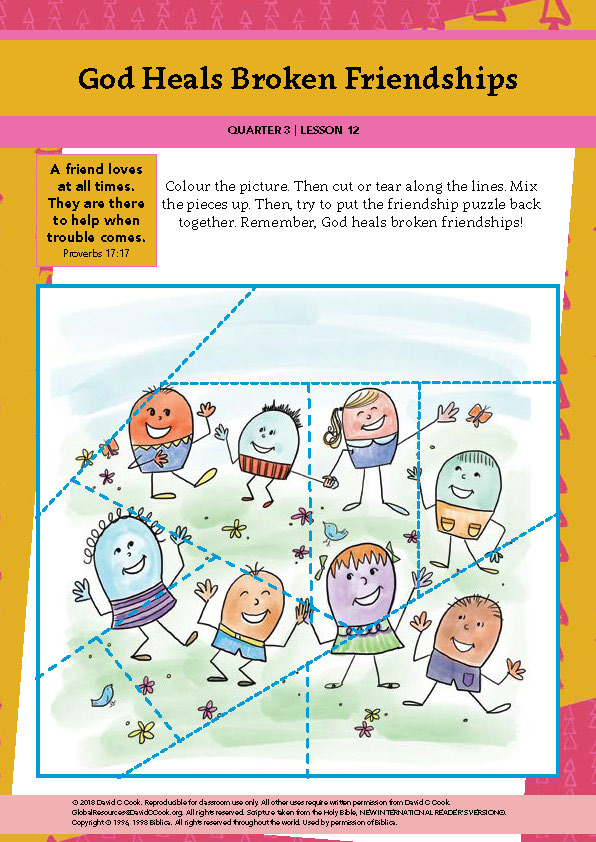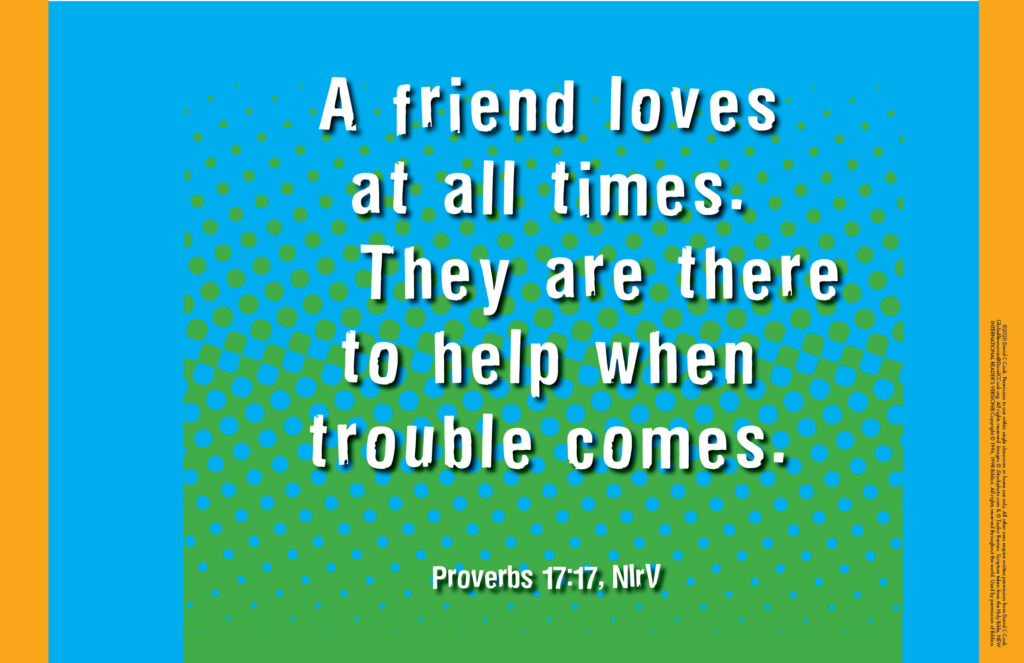During the lesson, the information for you to know is written in regular type, and what we suggest speaking or reading aloud to children is in bold. All resources for this lesson, including the Teacher Guide, Student Page, Family Connection Card, and other resources can be downloaded in a ZIP file by clicking on the following link:
In some lessons you will find "resource articles." These are articles written by experts from around the world to help equip you for your work with children and adolescents. Share them with parents or guardians if you consider it appropriate.
If an enemy were making fun of me, I could stand it. If he were getting ready to oppose me, I could hide. But it’s you, someone like myself. It’s my companion, my close friend. We used to enjoy good friendship at the house of God. We used to walk together among those who came to worship.
Psalm 55:12–14
Do these verses sadden you? Something has happened that separated these friends. You can hear the confusion and sorrow in the words. This friend the psalmist lovingly refers to is someone he regularly worshipped with and someone he walked beside. When a stranger says or does something against you, it usually does not wound you deeply. But when someone you care deeply about hurts you, the pain can be almost unbearable.
Do you have a friend who has hurt you deeply? Did it cause a separation between you? Do you want to fix your broken friendship? It is time to try to mend your broken friendship. If you let Him, God will help you. Ignoring the problem will not restore the relationship. Try to talk calmly with your friend about what happened to separate you from one another. Commit to listening even if you want to react and blame others for what has happened. Be willing to forgive to recover the friendship that once existed. God values friendship. Trust Him to help you mend your broken relationships.
Encourage families to talk to their children about how to heal broken friendships. The children can name 1 or more of the steps they learned in class today.
Teacher Tip: If possible, email or text the Family Connection Card to the families of your students.
Greet the children as they enter the teaching space. Ask each child to name a way he practiced being a friend last week.
The past few weeks, we have been learning about friendships. Today we will learn about how to heal broken friendships.
Sometimes friends have disagreements over small things like having different ideas of what to play. This can create friction between friends. When 2 things rub against each other it creates friction. When 2 friends have different ideas or 1 friend is unkind to another friend, it can cause friction.
Let’s see how friction feels. Gently press your hands together with your palms touching. Rub your hands together quickly. Continue rubbing your hands together.
Stop the children after 1 minute.
They feel hot.
Rubbing your hands together created friction, and the friction created heat. Friendships can have friction too. For example, you may notice things that bother you about your friend. You may get into small arguments with your friend. Over time, lots of friction can cause bigger problems.
Lightning is one example of something bigger created by friction. Inside of rain clouds, bits of ice bounce up and down. As the clouds grow and rub against one another, energy is created. When clouds build up enough friction, the energy created can explode out of them as lightning.
When a lot of friction builds up in a friendship, you may suddenly explode at your friend in anger. This is sure to cause an argument! Raise your hand if you have ever argued with a friend. Most people have.
Allow 3–4 children to respond.
Children may answer: I can talk to my friend about what is bothering me. I can stop and calm down. I can walk away and return when I am calm. I can ask God for help.
It is okay if you do not agree with your friend all of the time. You are different from each other and have different ideas about things. However, yelling and hitting are not okay. These actions hurt your friendship. When your argument explodes and becomes a fight, it can destroy your friendship. God cares about our friendships. He wants us to have friends in our lives.
Have your children sit in a circle for this part of the lesson.
Think for a moment about things that can break. This could include things that are delicate and easy to break or things that are strong and hard to break. For example, a glass could be broken if dropped on a hard surface.
Allow 2–3 children to respond to the following questions.
Some things break easily and others are hard to break. Now think about friendships.
Yes, a friendship can break.
Allow 2–3 children to respond.
Here are a few examples of things that can break a friendship: not caring what a friend needs or wants, not understanding what a friend wants or tries to say, and using unkind words to hurt a friend’s feelings.
When something valuable breaks, you want to fix it. The same is true for friendships. Broken friendships can be very difficult to deal with. They can make us feel sad and angry. Listen to what the Bible says about broken friendships:
Read the verse directly from your Bible.
A broken friendship is harder to handle than a city with high walls around it. And arguing is like the locked gates of a mighty city.
Proverbs 18:19
The Bible says that a broken friendship is like a city with high walls that you cannot enter. Once it is broken, it can be difficult to enter back into a friendship with someone. When a friendship breaks or is hurt, it is important to take steps to fix it.
It is okay if you and your friend make different choices and have different thoughts about things. Most of the time, those do not cause arguments. They turn into arguments when you do not stop, realize there is a problem, and then forgive each other. Here are some things you can do to fix a broken friendship. I will name a tip to help you fix your friendship. You will do a motion with me to help you remember the tip.
Let’s play a game to help us remember the tips we just learned. Remember, when friends argue and their relationship is broken, it is like a city with high walls and a locked gate. Let’s link arms to form a “city wall.” To win this game, you will work together to name all 4 of the tips you learned for healing a broken friendship. This will be the key to your city “gate.”
Make 1 of the motions that shows a tip for healing a broken relationship. Ask the children to name the tip. When a child names the correct tip, allow that child to unlink arms with the children next to him. Do this for each of the tips, but do not do them in order. Once all 4 tips have been named, congratulate the children for unlocking the city gates.
Optional: If you are using Student Pages, give the children 5 minutes to cut apart and reorder their puzzle pieces. Encourage them to put the puzzles back together at home.

Sadly, sometimes 1 of the friends is not willing to work at healing a friendship. When this happens, it is important for you to still show kindness to the person who used to be your friend. The Bible says:
If possible, live in peace with everyone. Do that as much as you can.
Romans 12:18
God wants us to live at peace with others as much as we can. This includes the friends who no longer want to be part of our lives.
When you have tried everything you can to heal the friendship, pray and leave that friendship in God’s hands. You have done all that you can to be at peace with that friend. When a friendship cannot be fixed, you can trust God with any pain you may feel.
Even good friends do not always get along. When something happens that hurts your friendship, it is easy to become angry. It is easy to do something hurtful to your friend. It is easy to avoid your friend or ignore him. This behavior will not help your friendship. Instead of acting that way, you should stop and deal with the problem right away. Stop. Pray. Listen. Stay calm. Be ready to forgive.
Pair up the children for the activity. If there is a group of 3 children, ask them to take turns.
In a moment, you will use the tips we learned today to act out situations. For each situation, identify which tips you can use to heal the broken friendship. I will read each situation out loud. You and your partner will act out your solution to the problem.
Choose 2 of the following situations for children to act out. If there is time, you may choose to act out all of the situations. Read 1 situation at a time to the children. In each situation, the friendship is broken. The children will act out what the friends can do to heal their friendship. Both friends need to help heal the friendship. Most of the time, there are tips that both friends can do. Give the children 2 minutes to act out each situation.
Joseph seems to enjoy feeling stronger and hurting Jeremy. How can Jeremy be a good friend to Joseph?
You all did a good job showing how you would heal a broken friendship. Remember that God wants to help you with your friendships. Quietly think for a moment about your friendships. Think about whether there is anything in 1 of your friendships that needs healing.
Pause for a moment for the children to think of their friendships.
If you have thought of a friendship that needs healing, ask God to help you try to heal it. I will say a prayer and pause after each sentence. You may choose to say the sentence silently when I pause.
In Jesus’ name, amen.
Let’s review our memory verse now.
A friend loves at all times. They are there to help when trouble comes.
Proverbs 17:17

Sing or chant this verse using the same melody or rhythm from the last time. If you were not present for the last lesson or do not remember how to sing the song, ask the children to help you. Have the children sing or chant with you. Repeat the words to the memory verse 3 times.
End class by saying this blessing, based on Matthew 5:23–24, over the children.
Blessing: May you have the courage to admit when there is something wrong between you and a friend. May God help you work out what is wrong and make your friendship strong again.
Lead the children in singing this quarter’s song if possible.
Life on Life ©2020 David C Cook. Reproducible for home or classroom use only. All other uses require written permission from David C Cook [email protected]. All rights reserved.